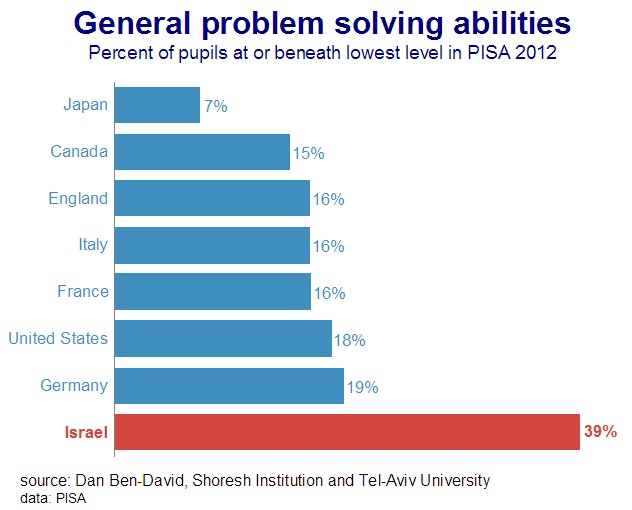When the weak and the strong by Dan Ben-David Israelis tend to view inequality and
poverty issues through the social justice lens. But altruistic motives are
insufficient for initiating serious core treatment of these problems. It is time to add an additional lens to the
glasses, one of personal interests.
After all, in a democracy, the weak and the strong have equal voting
rights, so we all benefit – or pay the price – of election outcomes. Workers lacking the tools or
conditions to succeed in an open and competitive economy desperately search for
salvation. In a democracy, what goes
around comes around on election day – whether it is motivated by revenge or by
a candid concern for the future. The OECD tests not only knowledge in
math, science and reading, which provide basic job market skills, areas in
which the children of Israel have been at the bottom of the developed world for
many years. The organization also tests
the problem solving abilities of 15 year olds.
The PISA exams define six levels of problem solving abilities. According to the organization, “level 1
students tend not to be able to plan ahead or set subgoals.” Concerns that they might be inundated
by foreigners, alongside difficulties that locals had in finding jobs, led many
Britons to vote for Brexit, requiring the country to secede from the European
Union. A full one-sixth of British
pupils are at level one or below (see figure).
This is a similar share to that in the United States, which sees entire
economic sectors declining or disappearing.
Americans voted in a new president promising to bring the back jobs from
China, India and Mexico. Who among the
voters was interested in hearing – or understanding – that a large share of the
lost jobs did not move abroad but evaporated as a result of technological
improvements? 
Magic formulas are not a replacement
for difficult solutions that could save a person who has lost his entire
income. But go tell this to voters who
are not “able to plan ahead or set subgoals.”
In Israel, 39% of the children are in this category, by far the highest
share in the developed world – and that does not include Haredim
(ultra-Orthodox) who do not participate in the PISA exams. There is a very strong correlation in
the PISA exams between the share of pupils with very low knowledge levels in
core subjects and the share of pupils unable to plan ahead or understand the
consequences of their decisions. Their
lack of basic tools to contend with a competitive economy is combined with a
lack of historical and civic knowledge that could alert them when leaders try
to sell magic formulas to improve their lot, formulas that have already been
tried, and have failed, in the past. The
injuries sustained are not only to them personally, but to all of us at the
national level. Is there any public policy more
important for the future of Israel’s economy and the sustainability of its
society than a comprehensive reform of the country’s education system tomorrow
morning? |